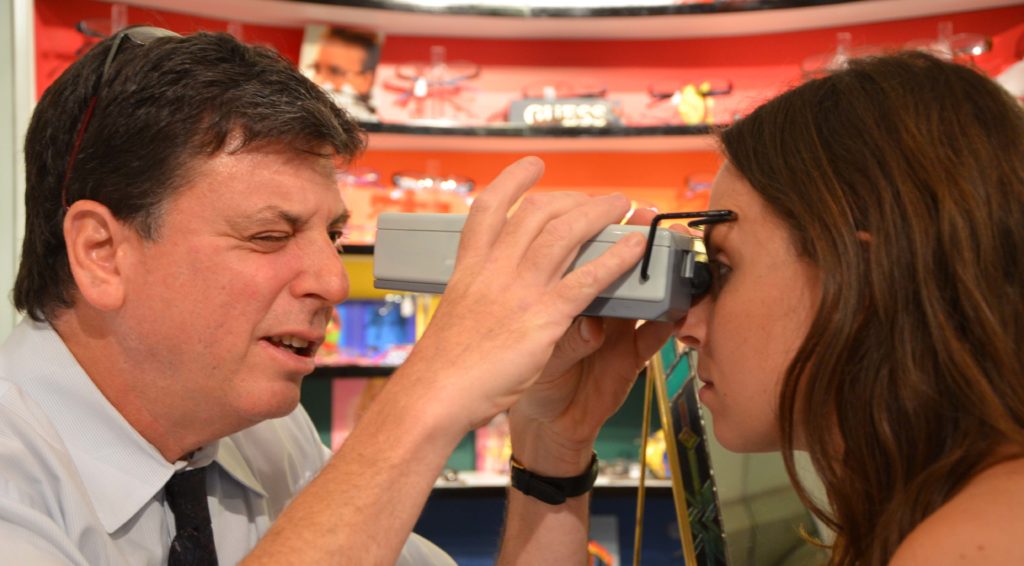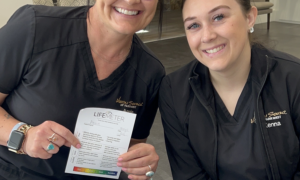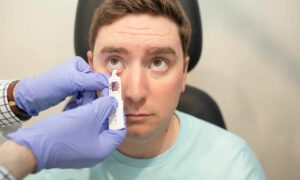By Chad Fleming, OD, FAAO
Dec. 21, 2017
At my practice, I prescribe specific products from the exam chair. However, capture rate depends on opticians following through with my Rx. Success in that depends on preparing and equipping opticians to succeed–by practicing tough questions and effective answers. Role-play exercises, in which my opticians practice what to say to patients about our products, improves our capture rate and the satisfaction of patients. Practicing how all of us, both doctors and support staff, converse with patients makes our practice stronger.
All conversations that involve purchasing glasses, ordering contact lenses, answering the phones, or replying to e-mail, are practiced ahead of time. All of us can be more effective communicators, and training in the optical imparts good communications skills. The training involves staff understanding that perception is reality, and that whether or not they like “selling” glasses or contact lenses, they are selling them. We like to say, “We all sell…doctors and staff sell better vision as a way of life…We sell better vision.”
Here are some of the key questions we practice answering in role-play exercises.
Plan Role-Playing Exercises
Role-playing in our office involves staff as patient and OD as optician. This allows a staff member to act like the kind of patient who frustrates them.
If a patient is really difficult, and the staff member ended up escalating the situation, then that staff member wants to prove that they did their best and no one could of dealt better with that patient.
We will then use our best staff, or doctors, to teach de-escalating techniques, so when others are in difficult circumstances they can reach a resolution without problems. We have utilized the book “Crucial Confrontations,” and taught many of those principles to our staff.
“Why are your glasses so expensive?”
“I can get my glasses for $10 online, why do I want to get them from you for more?”
Effective response: “Our glasses cost what they do because there are built-in services that you do not get online. For example, with the purchase of glasses through our office you can get adjustments, new nose pads, and eyewear cases, at no extra cost for the life of the glasses, not to mention our expertise in professional customer service, warranties and prescription verification. We could sell you glasses at prices that are very close to online prices, but we choose to use the highest quality products and work with manufactures that stand behind your product with warranties.”
“I’d still like to get the glasses somewhere else. What do I need?
Effective response: “No problem, we would be happy to provide you your prescription today, or you can always download and print it from the patient portal. You are a patient of ours, and we are your advocates in purchasing glasses. So, even if you do not get them from us, we want to help be a part of your purchase, as many places you run into can potentially take advantage of you by telling you things that are not true about glasses.”
To elaborate further, the optician then would ask: “Are you most likely to buy online or from a commercial establishment? If you purchase online, make sure they have verified the accuracy of the prescription and that it meets ANSI standards because a wrong prescription can lead to multiple symptoms. Also, ask about their return policy, warranties and if you pay shipping to and from, ask about adjustments and how they will verify the lenses are correctly aligned on your face.
If this sounds a little overwhelming, you are always welcome to purchase our Eyewear Service Agreement, which will provide some of these things for you. The warranty and exchange policies, including incorrectly made lenses, will have to go through the company you order from. It is important to us that you are taken great care of, and as your advocate, we want to do what we can. Have a great day and please let us know if we can do anything to help.”
Script Ideal Staff Responses
At our practice, we offer firm guidelines on how we want staff to respond to patient questions, but we allow for them to incorporate their own language, as well.
New staff may have experience in the “right way,” or “their way,” of doing things, but they have no experience in “our way” of taking care of patients.
We communicate this to new staff, so they don’t feel offended when we tell them to relearn something they have been doing for years.
Scripts are important because they allow your culture and brand to permeate throughout the whole office based on what your staff say to patients. Scripts also allow time for training on the front end. Then, when staff start to vary the script by personality, we can help further guide the conversation. —Chad Fleming, OD, FAAO
Is a generic AR just as good?
Effective response: “A generic AR coating is a good option, and will work for you. The reason I would encourage you to get a premium AR is because a two-year warranty, and the quality of the AR, enhances your visual experience. A premium AR will give you the same performance today as it will in a year.”
“I’ve not had a good experience here today. Can you help?”
Effective response: “I’m sorry. What would you like to see done today to resolve your concerns?”
Typically the patient is angry because they spent money for something that did not perform as they anticipated. There was a gap in value of product and cost. We look at it as a learning opportunity for staff as they did not set expectations correctly. Or we look at it as an unwelcome hard sell, or that the patient is unreasonable. In our practice, the end result of many upset patients is a complete return on their glasses. If the right answer for the patient is not unreasonable in the time or money required, we usually do it. We will pay $500 for a patient to not be blowing us up on social media.
We have found that the cost is minimal to give a patient a complete return, remake lenses in another pair of frames, or otherwise give them what they want, compared to the long-term damage of a patient slamming us by word-of-mouth or on social media. That said, we have also fired some patients after we returned their money because they were extremely unreasonable and they treated our staff badly.
A common trigger of anger is making a patient feel pressured to buy. Patients should never feel pressed to buy anything at our office. A hard sale will get a $1,000 purchase today and the loss of a patient tomorrow. We sell better vision through prescribing and education.
Chad Fleming, OD, FAAO, is a partner with Wichita Optometry, P. A. in Wichita, Kan. To contact: optometryceo@gmail.com



























